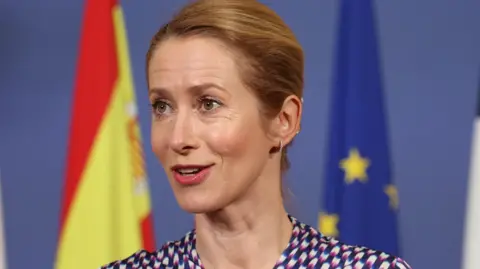### Fishing Should Not Hinder Defence Pact, Asserts EU Chief
Negotiations between the United Kingdom and the European Union regarding future fishing quotas must not obstruct the progress of a burgeoning security agreement, according to Kaja Kallas, the EU’s foreign policy chief. Kallas recently stated in an interview on BBC Newsnight that while there are still “a few elements” left to finalize in the deal, the core issue of fishing access appears to have been resolved. This assertion comes ahead of a highly anticipated summit in London, where both sides aim to unveil a comprehensive security and defense pact.
Historically, fishing rights and access have been contentious issues concerning the UK’s relationship with the EU, particularly for nations like France that have vocally advocated for maintaining fishing privileges in British waters. Kallas’s remarks suggest that a breakthrough regarding fishing may have occurred, indicating a shift from previous hardline positions on both sides.
During the interview, Kallas remarked, “I think we are over the fish,” suggesting significant progress in negotiations. However, she did acknowledge that while disagreements on fishing may have been mitigated, the overall agreement is still contingent upon resolving several other elements. Her optimism toward advancing discussions towards a security agreement is notable, especially given the political sensitivity surrounding fishing rights.
### Context of UK-EU Relations Post-Brexit
In the wake of Brexit, the UK has been working to reshape its political landscape and international relationships. The government’s renewed push for a defense agreement with the EU reflects Prime Minister Sir Keir Starmer’s vision for a “reset” of UK-EU ties. Starmer has expressed his intentions to foster closer relations with the EU, focusing on a comprehensive defense framework and a broader trade agreement that would benefit both parties.
One of the primary objectives of the UK’s negotiations includes securing a defense pact that not only enhances military cooperation but also opens avenues for British defense firms to participate in EU-wide procurement projects and access financial support schemes. Despite the small scale of the fisheries sector relative to the broader economic relationship between the UK and the EU, fishing rights remain a politically charged topic that has historically influenced negotiations.
Complications arise as the current fishing arrangements, established in the post-Brexit trade agreement of 2020, are set to expire in June of the following year. France, representing the interests of its fishing community, is advocating for a long-term commitment that would guarantee continued access to the UK’s fishing resources beyond 2026. This demand highlights the ongoing tensions and the complicated interplay between economic interests and political negotiations.
### Future of Youth Mobility and Gibraltarian Issues
In addition to fishing rights, another area of discussion involves a potential youth mobility scheme that would facilitate educational and work opportunities for young people from both the UK and the EU. The UK government has reflected some willingness to consider this proposal, which contrasts its previous stance of rejecting such arrangements.
The recent comments by European relations minister Nick Thomas-Symonds echoed a potential softening of attitudes within the UK government toward engaging with sensible EU proposals regarding youth mobility, a shift that could enhance bilateral relations moving forward. Nevertheless, the ruling Conservative party maintains its skepticism, framing any mobility agreement akin to reintroducing free movement, which they opposed during the Brexit campaign.
Further complicating the landscape are ongoing discussions about Gibraltar, the British territory that borders Spain. Spanish Foreign Minister José Manuel Albares has stressed that a resolution over the territory is fundamental in achieving a significant narrowing of the relationship between the UK and the EU. Talks continue as both sides seek a solution that satisfies their respective political agendas.
In summary, as the UK and EU continue to navigate the intricacies of their post-Brexit relationship, the fishing industry, security pacts, youth mobility schemes, and the status of Gibraltar remain pivotal discussions that will shape future collaborations. The balancing act of addressing these vital concerns while striving for mutual benefit is crucial for fostering solid and lasting ties between the two entities.



